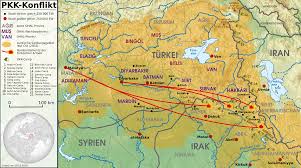The Complex Landscape of Kurdish Communities in Turkey

Introduction
The Kurdish population in Turkey has been a focal point of political and social tensions for decades. As the country’s largest ethnic minority, the Kurds have long sought greater autonomy and cultural recognition. In recent months, events have unfolded that highlight the complexities of this issue within Turkey’s socio-political framework.
Current Events and Situation
Recent data from the Turkish Statistical Institute indicates that Kurds represent approximately 15 to 20 percent of Turkey’s population, predominantly located in southeastern provinces. Discontent among Kurdish communities has been exacerbated by the Turkish government’s policies, which some critics argue suppress Kurdish identity and political representation.
In April 2023, the Turkish government launched a new military operation, targeting areas in northern Iraq believed to be strongholds of the Kurdistan Workers’ Party (PKK), labelled a terrorist organisation by Turkey, the United States, and the European Union. This escalation in military action raises concerns among international observers regarding potential human rights violations and the ongoing conflict’s impact on civilian populations in the region.
Moreover, the political landscape has seen shifts with the recent local elections, where pro-Kurdish parties have gained traction in several metropolitan areas. The Peoples’ Democratic Party (HDP), which advocates for Kurdish rights and greater democracy in Turkey, secured a significant number of seats despite facing government opposition and legal challenges. This electoral success presents a glimmer of hope for Kurdish aspirations within the existing political framework.
Conclusion
The situation for Kurdish communities in Turkey remains intricate and multifaceted, marked by a struggle for identity, rights, and recognition. As the Turkish government continues to engage in military actions against Kurdish forces, the potential for a long-term resolution appears elusive. However, the increased political representation of Kurdish parties in local elections may indicate a gradual shift towards greater inclusion in Turkish politics.
For readers, understanding the dynamics of Kurdish Turkey is essential as it affects regional stability and human rights across the broader Middle East. As international attention remains focused on the Kurdish issue, the developments in this historically rich and culturally diverse region will be crucial for future diplomacy and reconciliation efforts.









